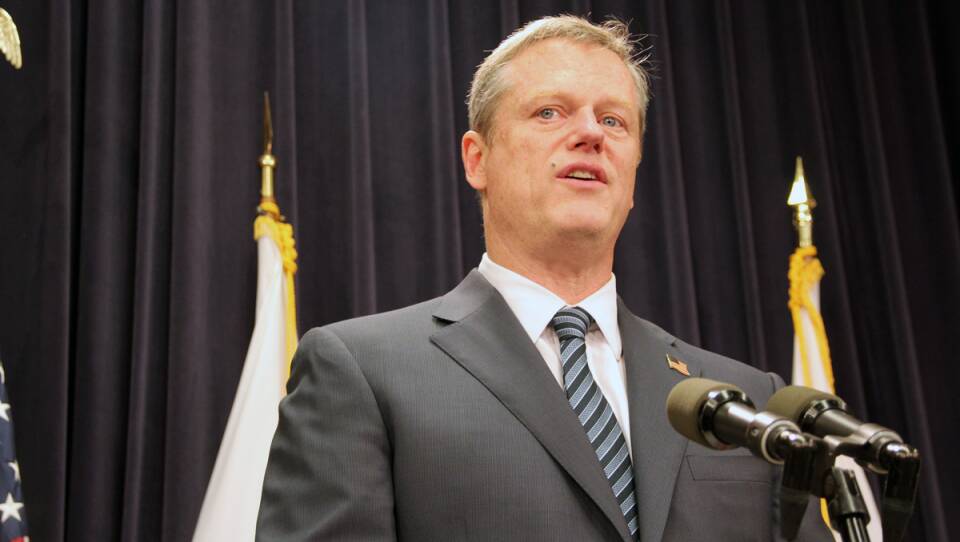The dream of hosting the 2024 Olympics in Boston may have died almost a month ago, but the official state report on the feasibility of the games found that the games may have been more expensive to pull off than estimated by organizers.
Gov. Charlie Baker supports the findings of a new report from the Brattle Group on the potential cost of the defunct 2024 Boston Olympics bid, and told reporters Tuesday he would not have signed onto any taxpayer guarantee to host the games.
Baker laid it out plainly Tuesday afternoon that the Brattle Group's take on the Olympics gamble could have been a bad one for the Commonwealth. Unlike the state or city, neither the United States Olympic Committee nor the International Olympic Committee would have been on the hook for any cost overruns.
"The International Olympics Committee makes a lot of rules, doesn't have a lot of risk," Baker said. "The USOC makes a lot of rules, doesn't have a lot of risk. The city and the state — the host — don't make a lot of the rules and carry most of the risk. And I think some of the issues that are raised by the Brattle Report specific to those issues, are part of the reason why for me you'd need to mitigate a lot more of the risk associated with this before I, certainly, would be comfortable about it and I think the senate president and the speaker feel the same way."
The thousands of hours that went into the Olympics bid before the plug was pulled by organizers last month haven't been all for naught. Boston Mayor Marty Walsh had rolled what was his office of Olympics planning into the staff working to put on Boston's quadrennial celebration in 2030. For his part, Baker said he's interested in pursuing a number of the projects Boston 2024 planners wanted to make a part of the Olympics.
"I do think a lot of the work around Widett Circle is absolutely worth pursuing and considering," Baker said. "I think some of the stuff around the continuation of the Emerald Necklace is worth pursuing. As I've said many times, I'd love to figure out a way to connect the Seaport District to Columbia Avenue and to the rest of Boston and that's certainly something I'm interested in pursuing."
The original late-nineteenth-century plan for Frederick Law Olmstead's Emerald Necklace park circuit called for the "Dorchesterway" to join Franklin Park and the Dorchester waterfront, creating a landscaped connection all the way to Pleasure Bay in South Boston.
The Brattle Group was commissioned by Baker and Legislative leaders in June, ahead of the release of the "2.0" revised bid. It finds that taxpayers would indeed have been the ones to bear the ultimate financial risk for the games.
And the report details quite a bit of risk, to boot. It warns of cost overruns, unforeseen overtime pay and estimates for sports facilities pegged by organizers at lower costs than what other host cities have spent.
The report says that in order to pull off the games, the state would have had to fund the MBTA at a higher amount and at an earlier time than is currently planned. The MBTA told investigators that the Boston 2024 estimate for T signal upgrades alone could have been off by over $1 billion.
And all that may not have brought much back to the Commonwealth, the report found. The economic and jobs impact of hosting the games would have measured less than one percent, the report found.
Baker wasn't the only one pivoting on the Brattle report's finding. Evan Falchuk, the independent candidate who collected 3.3 percent of the vote in 2014's election for governor, teamed up with the group who successfully opposed the gas tax inflation law that same year to try to force a ballot question on public funding for the Olympics. Falchuck questioned why, if the evidence was so clear, Democrats and Republicans hadn't made more of a commitment to protect taxpayers.
"The bid is over, but the Olympic saga must be a wake up call for voters," Falchuck, founder of the United Independent Party, said in a statement distributed Tuesday. "If your elected official isn't protecting your interests, it's time to do something about it."
PREVIOUSLY: The dream of hosting the 2024 Olympics in Boston may already be dead, but the official state report on the feasibility of the games finds that they may have been harder and more expensive to pull off than estimated.
The report finds that yes, the taxpayers of Massachusetts would have been the ones to bear the ultimate financial risk for the games. And the Brattle Group report details quite a bit of risk, warning of cost overruns, unforeseen overtime pay and estimates for facilities lower than what other host cities have spent.
All of that may not have brought much back to the commonwealth, either, the report found. The economic impact of hosting the games would have measured less than 1 percent.
Read the executive summary:
Full report:





